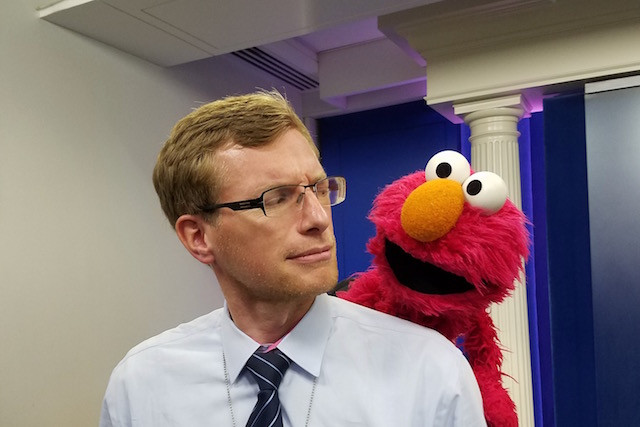Martine Huberty: Never mind meeting US presidents, how did you meet Elmo?
Philip Crowther: Elmo was at the White House while Obama was still president. This was at an event for children in the White House gardens, organised by Michelle Obama. The people who work with Elmo took him into the briefing room, which is where I spend a lot of time. They wanted a picture of Elmo at the briefing room podium, and a few of us decided to get some photos with him!
If you were not a journalist, what would you be?
I would be a bus driver. That’s the only other concrete dream job I had. Admittedly, I had it when I was about 8 years old, but I did have it all mapped out: I would be driving a bus around Luxembourg City, picking up passengers with a smile at each stop. But then other passions and obligations got in the way. I wasn’t good enough to make it as a professional football player, so the next best thing was being a football commentator. I still hope to get there one day.
If someone said to you that you were a shining ambassador for Luxembourg, how would you react?
With incredulity, or with a sheepish grin, depending on who was making the statement. Thank you, though. It’s an honour to be thought of in that way.
Why did you leave Luxembourg?
My father is British (though not proudly so these days), my mother is German, and my outlook on life has always been pretty international. An exit, therefore, was always more likely than not. But I also left because I could: my studies were expensive but paid for by my parents, and the languages I learnt in Luxembourg opened plenty of doors abroad. And anyway, there was no university in Luxembourg. That’s the main reason why for decades so many 18-year-olds left the country, though most do find their way back eventually.
How is Luxembourg viewed where you live?
Washington is full of diplomats, scholars and generally smart folk. Most have some notion of Luxembourg. The sheer amount of anecdotes people have on hand about Luxembourg still surprises me, though. A lot of them involve military service in Germany and frequent visits to neighbouring Luxembourg. One friend who works in international development keeps mentioning the troglodytes (I think she means the Casemates); a soldier tells me about his trips to Utopolis for the movies; and I had a discussion with the then secretary of state John Kerry about cycling with the Schleck brothers. The terms “LuxLeaks” and “tax haven” don’t tend to come up, unless I bring them up myself.
What is your image of Luxembourg now that you live abroad?
Luxembourg punches above its weight. Its role as a founding member of the EU still gives Luxembourg plenty of clout abroad. Also, its role in international finance and in hiding dubious transactions means it cannot be ignored. It’s a fine place, but let’s not forget the sheer amount of dirty business that goes on behind the scenes. Money from dubious regimes and dubious people passes through bank accounts in Luxembourg, and plenty of people make a lot of money off it, which engenders a whole industry. Luxembourg does very well as a result of this dirty business. I don’t think we should live our innocent lives in Luxembourg and try not to be aware of where a lot of the money comes from.
What do you miss about Luxembourg?
That’s an easy one. My parents. They aren’t from Luxembourg, but have made it their home. And they are right. There are many, many reasons to feel at home in the grand duchy. My father has successfully got his hands on a Luxembourg passport. I’m happy he can now vote in a haven of pro-European sentiment, surrounded unfortunately by a sea of newfound nationalistic tendencies.
When was the last time you were proud of Luxembourg?
When Aurélien Joachim scored the penalty to equalise in the World Cup qualifier against France at the Stade Josy Barthel. I knew my friends in Luxembourg were watching. I have no national identity as such, but when it comes to football I root for the Roud Léiwen. There’s some national pride for you.
